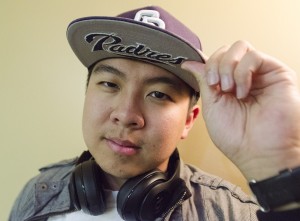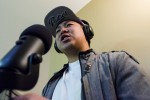Raymond Mai’s foray into rap was motivated by a pretty girl sitting next to him in class. Determined to catch her attention, Mai scribbled in his notebook a love poem, which he rapped to her during break.
The musical expression of love did not impress the girl, but it intrigued another classmate who invited Mai over to his home studio after school to record. Mai initially felt awkward, but over time he gained enough confidence to eventually turn his poetry into a mixtape.
Mai, a UCLA alumnus who raps by the stage name MACKmai, waited until Feb. 20 to release his debut mixtape “Second to None (220)” on SoundCloud, which has racked up over 3000 plays.
In “Second to None (220),” Mai converted his artistic expression into a captivating composition of electronic beats and slurred lyrics, said Sujith Cherukumilli, a third-year political science student and Mai’s friend from college.
To make his mixtape, Mai secretly wrote down verses in class, on Bruin Walk or at lunch. It was his secret project on the side, and when he finally dropped his mixtape Feb. 20, it took his friends by surprise.
“MACKmai was a running joke amongst our group. Raymond loved rapping but he was (initially) terrible at it,” Cherukumilli said.
Mai said his mixtape is a platform for self-reflection that taps into family, relationships and ambitions of becoming somebody and honoring his parents’ sacrifices for him.
Growing up in a black- and Latino-dominated area in southeast San Diego, Mai became aware of his ethnic roots after meeting other Asian-American students at UCLA. Mai said he realized the hardships his immigrant parents went through and decided to preserve their legacy through his mixtape.
In his track “Made in America,” Mai narrates the struggles of his grandmother and single mother, who emigrated from Vietnam during war and were trying to live off their minimum wage jobs in the United States.
Mai sought the sound engineering assistance of In Fidelity Recordings in Van Nuys, Los Angeles to begin recording his mixtape.
Mai brought with him to the studio a Google doc with all the lyrics he had been tweaking and re-tweaking at home as he rapped to instrumentals. He would stay up through the night, lying in his bed, replaying the same beats, decomposing their layers and deciding whether they sounded right.
In the studio, Mai was nitpicky, said Andrew Alas, a third-year economics student. Mai would record the tracks again and again, overlay them, add ad libs plus sound effects and autotune until the sound was perfect.
Mai said his initial raps sounded awkward, his flow was off beat and his voice was hesitant. But the production process fascinated Mai, who kept asking to visit the studio every day after school until practice made him confident.
Mai said he would seize every opportunity to build his brand, by performing gigs at UCLA and free-styling for anyone he met. Los Angeles offers endless opportunities to get discovered, Mai said, and he is currently obtaining physical copies of “Second to None (220)” to hand away to passerby on the streets.
Mai said he swipes right on Tinder just to message girls to check out his mixtape.
“I will be that annoying guy asking everyone to download my mixtape,” Mai said. “Sometimes I joke ‘I do birthday parties, too.'”
Cherukumilli said Mai is an influential role model for many kids of his community because Mai’s education at UCLA, his investment career and his mixtape are admirable accomplishments. He said Mai’s music praises the fruits of hard work and perseverance.

(Shelby Scoggins/Daily Bruin)
In his next project, “State of Mind,” Mai will produce an album based on a screenplay he is currently writing. Mai said he will delve deeper into his lonely childhood and the hardships of his community.
Growing up in a neighborhood that was predominantly black, Mai said he learned that rap was a voice for minorities. Mai said he borrowed this musical style and carved it in his own unique way to express his struggle of escaping the bubble he grew up in.
“It sounds really cheesy but I remember this scene … the blinds were open, and I’m laying on my bed looking out at the sky and I thought, ‘There’s so much out there,’” Mai said. “I wanna capture that.”
